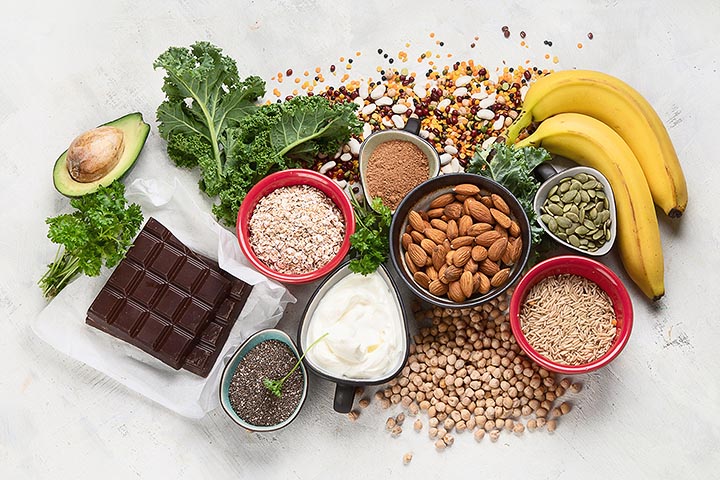General Wellness & Healthy Lifestyle
How to Support Muscles with Exercise, Diet & Two Important Nutrients

You may know that exercise is important for muscles, but did you know that nutrition is important too? Vitamin D and magnesium are two important nutrients that help support your muscles.* And just like taking care of your skin or hair, your muscles need ongoing maintenance. Let’s discuss ways to build strong muscles to support a healthy you!
Why is it important to take care of your muscles?
You have over 600 muscles in your body! These muscles do so much for you – moving, breathing, carrying things, and even digesting your food. Simply put, you want to take care of your muscles so they can take care of you. By keeping your muscles active and healthy, it helps you feel your best.
What are the different types of muscles?
There are three different kinds of muscle tissue in your body: skeletal, smooth, and cardiac.
Skeletal muscles
Skeletal muscles may be what you think of when you hear the term “muscle.” They are the ones that connect with your bones (your skeleton) so that you can move. These are also called voluntary muscles because we choose to engage them by moving.
Smooth muscles
Smooth muscles are also known as involuntary muscles because you don’t actively control them. These are the muscles of some of your organs, and they work without you having to think about it. One example of smooth muscle is the muscle in your digestive tract. These muscles move food along your intestines as you digest it.
Cardiac muscle
Cardiac muscle is the unique muscle of your heart and is a special type of smooth muscle. This muscle pumps blood throughout your body and can adjust how much blood is pumping based on what your body needs at the moment.
What builds strong muscles?
Physical activity and exercise are how you strengthen your muscles. But it’s also important to fuel your body properly by consuming the essential nutrients you need every day, to support your body so it can be active.
What exercises make muscles stronger?
Anything that gets you up and moving not only benefits your overall health but also plays a pivotal role in strengthening muscles. And remember, some activity is better than no activity! Talk with your healthcare provider before starting any new exercise program.
Here are some types of exercises that can help:
Muscle-strengthening activities
Exercises that challenge your muscles will help them get stronger—and an added bonus, it will help your bones get stronger too! Try using weights or resistance bands as muscle-building activities. You can also use your body weight with exercises such as push-ups or sit-ups. Remember, it’s important to start with light weights/resistance or just your body weight and gradually increase progress over time.
Muscle-stretching activities
It’s also important to stretch and relax your muscles. Increasing your flexibility increases your freedom of movement and can help make daily activities and exercise easier. Yoga, pilates, or a structured stretching routine can help keep your muscles flexible and strong.
Balance-enhancing activities
Improving your balance helps with stability and can also keep your muscles healthy by actively using them. Falls are a common cause of fractures, so any activity that helps with balance can help protect your bones and muscles. It’s hard to keep your muscles strong if you are stuck recovering from a broken bone! Try activities like yoga or tai chi to improve both your balance and muscle health.
What foods increase muscle strength?
There are no foods that increase muscle strength. Exercise is what increases muscle strength, but you need to eat enough food to fuel your body for the exercise.
An overall healthy diet full of nutritious foods is a great way to support your muscles. A healthy diet includes consuming a wide variety of fruits and vegetables, beans, seeds and nuts, healthy fats, and lean protein.
Ensuring that you get enough protein throughout the day is another helpful way to ensure your muscles have what they need to be active and repair themselves after exercise. If you eat meat, consider lean meats such as poultry, fish, low-fat dairy, and beef or pork with excess fat removed. And don’t forget about meatless options too! Beans, tofu, nuts, and seeds also have protein and have the added benefit of additional fiber too.
In addition to eating a healthful diet, certain nutrients play an important role in supporting your muscles, including magnesium and vitamin D*:
Vitamin D
Vitamin D is an essential vitamin that provides bone and immune support, and helps with calcium absorption.* Vitamin D also supports muscle health through its role in muscle contraction.*
Unlike other vitamins, your body can produce vitamin D from the sun depending on the time of year and where you live. Vitamin D is also found in a few foods, such as egg yolks, cheese, fatty fish, and some mushrooms. Cow’s milk and some plant milks are fortified with vitamin D.
Since vitamin D is not always an easy nutrient to get from food or the sun, many people find it convenient to get vitamin D from supplements. Vitafusion offers vitamin D supplements in both gummy and soft chews!
Magnesium
Magnesium is a mineral that is involved in over 300 processes in your body. Helping many parts of your body, magnesium supports nerve, heart, and bone health.* Magnesium is also part of proper muscle function by helping support muscle relaxation.*
Magnesium is found in foods like beans, nuts, seeds, chocolate, and dairy products.If you are looking for a magnesium supplement, vitafusion has you covered! vitafusion Magnesium gummies contain 165mg of Magnesium in every 2-gummy serving in a tasty tropical citrus flavor.
Build strong muscles: Strength from the inside out
Taking care of your muscles is a great way to invest in yourself and your health. Physical activity and weight-bearing exercise can help improve muscle strength. Ensuring you are consuming a healthy diet, including magnesium and vitamin D also supports muscle health.* And if you want a tasty way to get these essential minerals, vitafusion offers gummy supplements to support your needs! So, embrace the journey, stay consistent, and pave the way for a stronger and healthier you!
Brought to you by the vitafusion™ nutrition experts.



